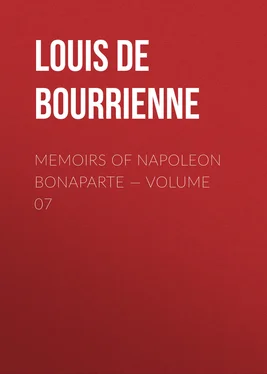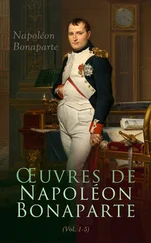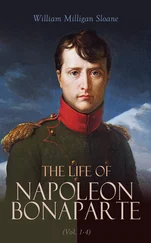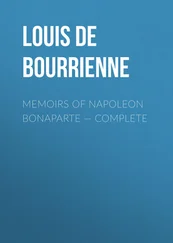Louis Bourrienne - Memoirs of Napoleon Bonaparte — Volume 07
Здесь есть возможность читать онлайн «Louis Bourrienne - Memoirs of Napoleon Bonaparte — Volume 07» — ознакомительный отрывок электронной книги совершенно бесплатно, а после прочтения отрывка купить полную версию. В некоторых случаях можно слушать аудио, скачать через торрент в формате fb2 и присутствует краткое содержание. Жанр: Биографии и Мемуары, История, foreign_edu, foreign_antique, foreign_prose, на английском языке. Описание произведения, (предисловие) а так же отзывы посетителей доступны на портале библиотеки ЛибКат.
- Название:Memoirs of Napoleon Bonaparte — Volume 07
- Автор:
- Жанр:
- Год:неизвестен
- ISBN:нет данных
- Рейтинг книги:4 / 5. Голосов: 1
-
Избранное:Добавить в избранное
- Отзывы:
-
Ваша оценка:
- 80
- 1
- 2
- 3
- 4
- 5
Memoirs of Napoleon Bonaparte — Volume 07: краткое содержание, описание и аннотация
Предлагаем к чтению аннотацию, описание, краткое содержание или предисловие (зависит от того, что написал сам автор книги «Memoirs of Napoleon Bonaparte — Volume 07»). Если вы не нашли необходимую информацию о книге — напишите в комментариях, мы постараемся отыскать её.
Memoirs of Napoleon Bonaparte — Volume 07 — читать онлайн ознакомительный отрывок
Ниже представлен текст книги, разбитый по страницам. Система сохранения места последней прочитанной страницы, позволяет с удобством читать онлайн бесплатно книгу «Memoirs of Napoleon Bonaparte — Volume 07», без необходимости каждый раз заново искать на чём Вы остановились. Поставьте закладку, и сможете в любой момент перейти на страницу, на которой закончили чтение.
Интервал:
Закладка:
These compliments were far from displeasing to the First Consul, who had no objection to flattery though he despised those who meanly made themselves the medium of conveying it to him. Duroc once told me that they had all great difficulty in preserving their gravity when the cure of a parish in Abbeville addressed Bonaparte one day while he was on his journey to the coast. "Religion," said the worthy cure, with pompous solemnity, "owes to you all that it is, we owe to you all that we are; and I, too, owe to you all that I am."
—[Not so fulsome as some of the terms used a year later when Napoleon was made Emperor. "I am what I am," was placed over a seat prepared for the Emperor. One phrase, "God made Napoleon and then rested," drew from Narbonne the sneer that it would have been better if the Deity had rested sooner. "Bonaparte," says Joseph de Maistre, "has had himself described in his papers as the 'Messenger of God.' Nothing more true. Bonaparte comes straight from heaven, like a thunderbolt." (Saints-Benve, Caureries, tome iv. p. 203.)]
CHAPTER XX
1803.
Presentation of Prince Borghese to Bonaparte—Departure for Belgium Revival of a royal custom—The swans of Amiens—Change of formula in the acts of Government—Company of performers in Bonaparte's suite—Revival of old customs—Division of the institute into four classes—Science and literature—Bonaparte's hatred of literary men —Ducis—Bernardin de Saint-Pierre—Chenier and Lemercier— Explanation of Bonaparte's aversion to literature—Lalande and his dictionary—Education in the hands of Government—M. de Roquelaure, Archbishop of Malines.
In the month of April 1803 Prince Borghese, who was destined one day to become Bonaparte's brother-in-law by marrying the widow of Leclerc, was introduced to the First Consul by Cardinal Caprara.
About the end of June Bonaparte proceeded, with Josephine, on his journey to Belgium and the seaboard departments. Many curious circumstances were connected with this journey, of which I was informed by Duroc after the First Consul's return. Bonaparte left Paris on the 24th of June, and although it was not for upwards of a year afterwards that his brow was encircled with the imperial-diadem, everything connected with the journey had an imperial air. It was formerly the custom, when the Kings of France entered the ancient capital of Picardy, for the town of Amiens to offer them in homage some beautiful swans. Care was taken to revive this custom, which pleased Bonaparte greatly, because it was treating him like a King. The swans were accepted, and sent to Paris to be placed in the basin of the Tuileries, in order to show the Parisians the royal homage which the First Consul received when absent from the capital.
It was also during this journey that Bonaparte began to date his decrees from the places through which he passed. He had hitherto left a great number of signatures in Paris, in order that he might be present, as it were, even during his absence, by the acts of his Government. Hitherto public acts had been signed in the name of the Consuls of the Republic. Instead of this formula, he substituted the name of the Government of the Republic. By means of this variation, unimportant as it might appear, the Government was always in the place where the First Consul happened to be. The two other Consuls were now mere nullities, even in appearance. The decrees of the Government, which Cambaceres signed during the campaign of Marengo, were now issued from all the towns of France and Belgium which the First Consul visited during his six weeks' journey. Having thus centred the sole authority of the Republic in himself, the performers of the theatre of the Republic became, by a natural consequence, his; and it was quite natural that they should travel in his suite, to entertain the inhabitants of the towns in which he stopped by their performances. But this was not all. He encouraged the renewal of a host of ancient customs. He sanctioned the revival of the festival of Joan of Arc at Orleans, and he divided the Institute into four classes, with the intention of recalling the recollection of the old academies, the names of which, however, he rejected, in spite of the wishes and intrigues of Suard and the Abby Morellet, who had gained over Lucien upon this point.
However, the First Consul did not give to the classes of the Institute the rank which they formerly possessed as academies. He placed the class of sciences in the first rank, and the old French Academy in the second rank. It must be acknowledged that, considering the state of literature and science at that period, the First Consul did not make a wrong estimate of their importance.
Although the literature of France could boast of many men of great talent, such as La Harpe, who died during the Consulate, Ducis, Bernardin de Saint-Pierre, Chenier, and Lemercier, yet they could not be compared with Lagrange, Laplace, Monge, Fourcroy, Berthollet, and Cuvier, whose labours have so prodigiously extended the limits of human knowledge. No one, therefore, could murmur at seeing the class of sciences in the Institute take precedence of its elder sister. Besides, the First Consul was not sorry to show, by this arrangement, the slight estimation in which he held literary men. When he spoke to me respecting them he called them mere manufacturers of phrases. He could not pardon them for excelling him in a pursuit in which he had no claim to distinction. I never knew a man more insensible than Bonaparte to the beauties of poetry or prose. A certain degree of vagueness, which was combined with his energy of mind, led him to admire the dreams of Ossian, and his decided character found itself, as it were, represented in the elevated thoughts of Corneille. Hence his almost exclusive predilection for these two authors With this exception, the finest works in our literature were in his opinion merely arrangements of sonorous words, void of sense, and calculated only for the ear.
Bonaparte's contempt, or, more properly speaking, his dislike of literature, displayed itself particularly in the feeling he cherished towards some men of distinguished literary talent. He hated Chenier, and Ducis still more. He could not forgive Chenier for the Republican principles which pervaded his tragedies; and Ducis excited in him; as if instinctively, an involuntary hatred. Ducis, on his part, was not backward in returning the Consul's animosity, and I remember his writing some verses which were inexcusably violent, and overstepped all the bounds of truth. Bonaparte was so singular a composition of good and bad that to describe him as he was under one or other of these aspects would serve for panegyric or satire without any departure from truth. Bonaparte was very fond of Bernardin Saint-Pierre's romance of 'Paul and Virginia', which he had read in his boyhood. I remember that he one day tried to read 'Les etudes de la Nature', but at the expiration of a quarter of an hour he threw down the book, exclaiming, "How can any one read such silly stuffy. It is insipid and vapid; there is nothing in it. These are the dreams of a visionary! What is nature? The thing is vague and unmeaning. Men and passions are the subjects to write about—there is something there for study. These fellows are good for nothing under any government. I will, however, give them pensions, because I ought to do so, as Head of the State. They occupy and amuse the idle. I will make Lagrange a Senator—he has a head."
Although Bonaparte spoke so disdainfully of literary men it must not be taken for granted that he treated them ill. On the contrary, all those who visited at Malmaison were the objects of his attention, and even flattery. M. Lemercier was one of those who came most frequently, and whom Bonaparte received with the greatest pleasure. Bonaparte treated M. Lemercier with great kindness; but he did not like him. His character as a literary man and poet, joined to a polished frankness, and a mild but inflexible spirit of republicanism, amply sufficed to explain Bonaparte's dislike. He feared M. Lemercier and his pen; and, as happened more than once, he played the part of a parasite by flattering the writer. M. Lemercier was the only man I knew who refused the cross of the Legion of Honour.
Читать дальшеИнтервал:
Закладка:
Похожие книги на «Memoirs of Napoleon Bonaparte — Volume 07»
Представляем Вашему вниманию похожие книги на «Memoirs of Napoleon Bonaparte — Volume 07» списком для выбора. Мы отобрали схожую по названию и смыслу литературу в надежде предоставить читателям больше вариантов отыскать новые, интересные, ещё непрочитанные произведения.
Обсуждение, отзывы о книге «Memoirs of Napoleon Bonaparte — Volume 07» и просто собственные мнения читателей. Оставьте ваши комментарии, напишите, что Вы думаете о произведении, его смысле или главных героях. Укажите что конкретно понравилось, а что нет, и почему Вы так считаете.












